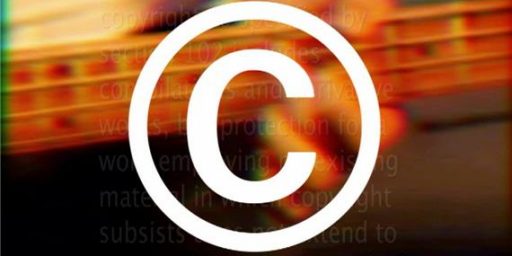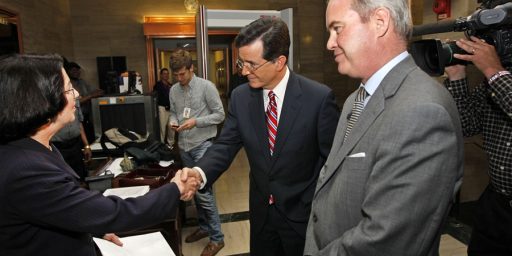Stephen Colbert PAC Authorized by FEC
The Stephen Colbert Super PAC that began as a satire has now been blessed by the real FEC. What exactly this means is not yet clear.
The Stephen Colbert Super PAC that began as a satire has now been blessed by the real FEC. What exactly this means is not yet clear.
Cristina Marcos for The Hill (“FEC rules in favor of Stephen Colbert“):
The Federal Election Commission ruled Thursday that comedian Stephen Colbert could form his eponymous political action committee and use his show to promote it.
“60 days ago today, on this very spot, a young man petitioned the FEC for permission to form a super PAC to raise unlimited monies and use those monies to determine the winners of the 2012 election,” Colbert declared to supporters outside the FEC building after the commissioners issued their advisory. “I am sorry to say, we won.”
“It has been said that freedom isn’t free. Today, we have placed a sizable down payment,” he noted.
The six FEC commissioners issued an unanimous advisory opinion to Colbert at their monthly meeting Thursday, stating that he could form the “Colbert Super PAC” with a media exemption. The exemption allows news outlets to report on campaigns without having their work considered a contribution, which would then have to be filed on a candidate’s disclosure forms.
The commissioners did rule in a 5-1 vote that Viacom would have to disclose payments if Colbert were to place advertisements on any media that was not “The Colbert Report.” Commissioner Donald McGahn disagreed with this portion of advisory and voted against.
Thursday’s ruling means that Colbert can use his Comedy Central show to promote his PAC without it qualifying as an expenditure.
But, as The Atlantic‘s Chris Good explains (“Colbert’s ‘SuperPAC’ Pushes the Limits of Election Law“) the boundaries are fuzzy–and Colbert himself hasn’t quite figured out what his goal is.
With the FEC’s approval, Colbert will now:
- Take in unlimited donations from nearly any source, other than foreign nationals and government contractors
- Air TV and radio ads expressly telling viewers and listeners to vote for certain candidates — but his group cannot give money directly to those candidates
- Report contributions to the Federal Election Commission
- Report spending on campaign ads
The trend in recent years among soft-money groups has been to file with the IRS under section 527 of the U.S. tax code, and not with the FEC, thereby evading reporting requirements under the guise of “issue advocacy.” Colbert, meanwhile, has chosen to register with the FEC and be subject to greater disclosure requirements. Today’s development, hinted at by previous FEC rulings, is that an FEC-registered group, not a 527, can take in unlimited money from individuals, corporations, and unions as long as it does not donate any of that money directly to candidates. It can air ads telling people to vote for candidates, but it cannot give its money directly to their campaigns.
Despite the recent trend, most independent political groups operate under far greater restrictions than Colbert’s new organization. Most register with the FEC as PACs, like Colbert’s new group. But, unlike his group, most donate money directly to candidates. Because they do, most independent political groups cannot receive more than $5,000 from an individual each election cycle, and they cannot take donations from corporations or unions.
Because Colbert’s group will not give any money directly to candidates — instead airing independent ads to support them — Colbert can take donations of any size.
[…]
Colbert had sought guidance from the FEC on how to handle air-time and help from Viacom, Comedy Central’s parent company — and this is the area in which his SuperPAC has forced precedents with implications for other media companies, like Fox News.
The FEC ruled today that Viacom can fund Colbert’s group, without limit, as long as it only helps out with ads that air during his show:
- Discussion of Colbert’s SuperPAC during his show is not considered a contribution to the PAC from Viacom — an application of the standard “media exemption,” which allows media outlets to offer commentary on political groups and candidates without that commentary being deemed a contribution. Under this rule Jon Stewart can comment on Colbert’s SuperPAC, too.
- If Colbert uses his air-time to run PAC-produced independent expenditures — i.e., a SuperPAC commercial that tells people to vote for a particular candidate — Viacom can pay for everything. It can produce the ad. Viacom does not have to report to the FEC how much it spent in doing so; the production and air-time are not considered a contribution to the PAC.
- Viacom cannot fund ads to run outside of Colbert’s own show, or on any other network.
Colbert had considered, according to FEC documents, having the staff of his show produce campaign ads, airing them during his own show, and then paying other media companies to air those same ads on other networks — a prospect with potentially vast implications for Fox News, which employs political figures like Mike Huckabee and Sarah Palin, both of whom have PACs of their own.
Colbert told the commissioners he didn’t really know “what we’re going to do with the ads, where we’re going to place them, because we don’t have the PAC yet.” But had it allowed Colbert to air Viacom-funded ads outside his show, Fox, for instance, could conceivably have funded the production of political ads for Huckabee’s HuckPAC to air outside his own weekend show on Fox.
The FEC told Colbert he can’t do that. But, for the purposes of Colbert’s allotted time on Comedy Central, Viacom and Colbert’s TV staff can spend unlimited time and resources making PAC-related commercials, without reporting any of that to the FEC.
While this was all done to show the absurdity of treating money as political speech and allowing unlimited spending to influence public opinion, I’m having trouble seeing any problem with this result. Why shouldn’t a popular opinion maker be able to collect money and spread his message as far and wide as possible?





You’ll probably get your answer when he starts airing his ads.
Depending on how you are looking at it, many reasons. Disclosure in how money is collected is surely important, and therefore needs to be regulated, so people can see for themselves if this popular opinion maker is being bought and to see whether the money he collects is influencing what message he is spreading. Disclosure on how money is spent needs to be regulated as well. Is the money being spent on production purposes to spread the message? That sounds innocent enough. What about if it’s being spent on access or behind the scenes promotion of other agents? That’s less innocent. The problem isn’t of collecting and spending. It’s of information and manipulation. If the public doesn’t have access to the information, they won’t know what manipulation is going on. The more an agency wants to collect and spend, the more they should be burdened with tabulating precisely how they are collecting and where they are spending.